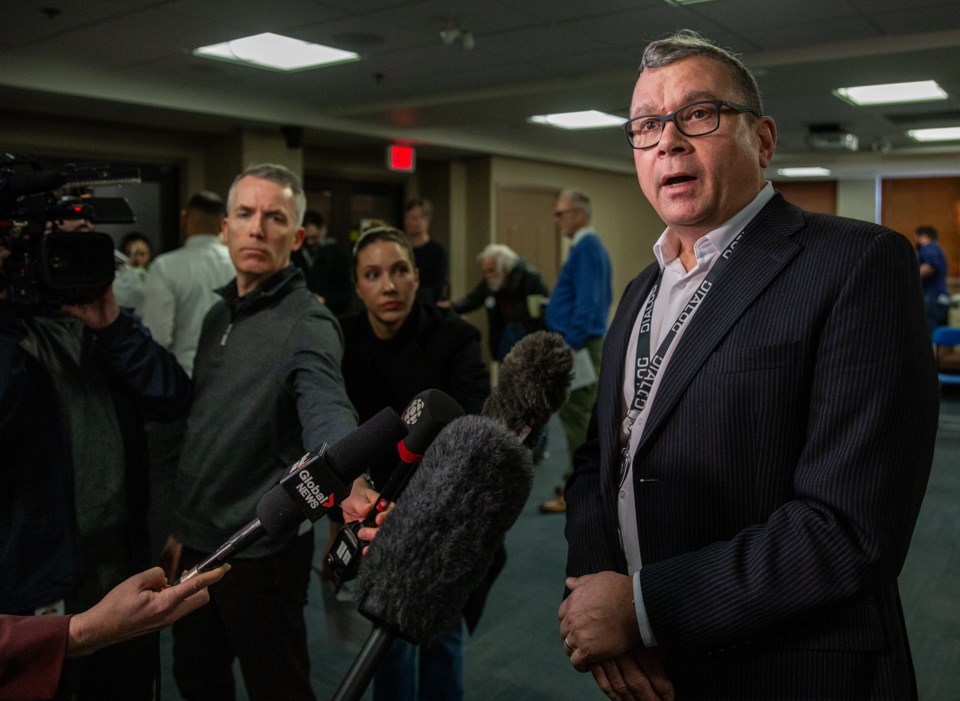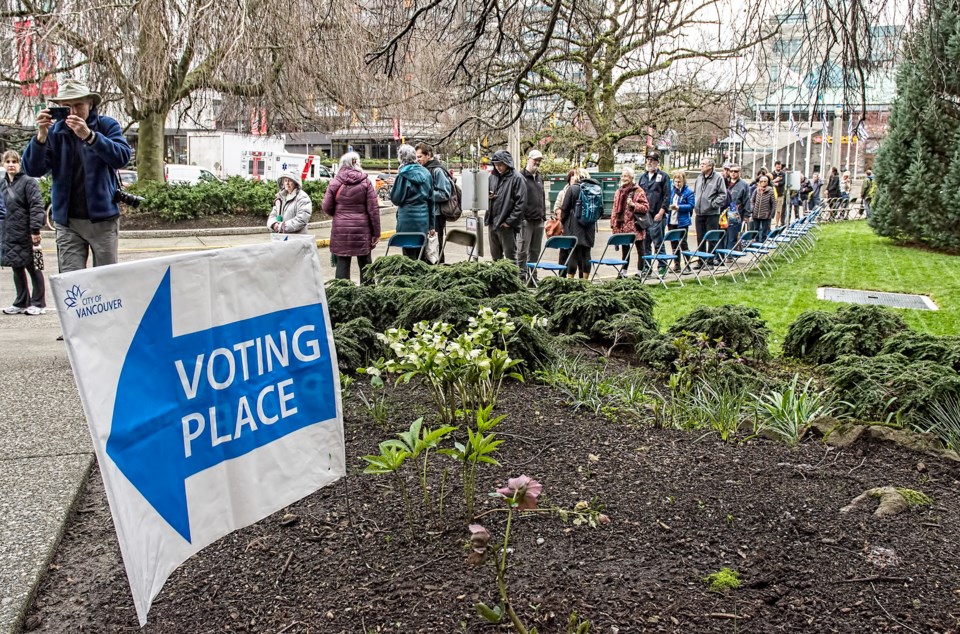Should Vancouver’s civic elections be run by Elections BC?
It was a question that was considered by Vancouver city council at a recent meeting after Coun. Mike Klassen urged his colleagues to support him in exploring the idea of the province’s non-partisan electoral organization taking over what has been a city-run function.
Klassen’s push came May 20 after reviewing a staff report on the April 5 byelection that revealed the vote to fill two council seats cost $1.6 million and was hampered by long lineups, where voters in some cases waited up to 3.5 hours to cast a ballot.
“The provincial government through Elections BC already regulates every single aspect of our local elections, except for the voting process,” said Klassen, referencing campaign financing rules administered by Elections BC.
“Elections are facing increasing threats. The level of complexity is becoming very clear. Every measure, I think, really needs to be considered to make sure we protect the integrity of our elections.”
'Consistent threats'
He pointed to Romania, where a far-right candidate was elected president in December 2024, only to have the election annulled because of suspicious TikTok accounts and accusations of secret payments to online influencers.
Vancouver staff found nothing concerning or untoward in the operation or outcome of the April 5 byelection vote, which was saw Sean Orr of COPE and Lucy Maloney of OneCity elected to the 11-member council.
Klassen didn’t suggest any wrongdoing or influence, but said he was concerned about “the long-term future of our election system, and the fact that there are consistent threats that are being faced by many jurisdictions.”
He suggested Elections BC should administer the elections of all the province’s municipalities that have populations of 50,000 or more.
“If we actually do have a crisis in a future election as a result of some kind of miscount or some kind of election interference, that would be incredibly damaging to the reputation of our elections, and possibly would create more cynicism and less voter turnout,” Klassen said.

'Downloaded cost'
Coun. Brian Montague asked Klassen if a shift to have Elections BC run Vancouver’s next civic election in October 2026 would include covering the cost. The staff estimate for the 2026 election is $6 million.
“There's a lot of turnover and change that happens within municipalities themselves,” Klassen answered. “It would be nice if there was a professional ongoing team that the province manages that would be able to manage those elections. So yes, some of those costs would be borne by the province.”
Added Klassen: “And again, they regulate all aspects of our electoral system, including how we raise money, all the rules associated with any kind of candidates, but they do not manage our elections, and I think that's something that we want to consider.”
In response, Montague said he would support Klassen’s request that Mayor Ken Sim write Minister of Housing and Municipal Affairs Ravi Kahlon about initiating discussions on the potential for Elections BC to administer civic elections.
“I'm not necessarily convinced about the 50,000 as the mark — maybe it's 100,000, but those are semantics,” he said. “I do see this as another downloaded cost to the City of Vancouver, and I think it is time for that discussion to happen.”
'Bristle at the idea'
In the end, a majority of councillors shot down the attempt by Klassen and Montague, with those opposed arguing the current setup works best, despite complaints about not enough advance voting days and lineups.
“I can tell you that a lot of local governments would bristle at the idea that Vancouver has initiated a review to have the province administer local elections,” said Coun. Pete Fry.
“The reason we have local elections administered by local governments is in no small part because we know our communities best. And when I say we, I mean staff, I mean policy makers, I mean council.”
Added Fry: “To have the province step in and determine how we're going to run local elections, where we're going to have voting stations and that kind of thing—and ultimately, will probably charge us for the privilege somehow down the line—doesn't make a ton of sense to me.”
Coun. Peter Meiszner agreed with Fry’s points, saying city staff was best placed to manage local elections.
“There are certainly some areas for improvement, and staff have also identified those, and I know we're going to work on that,” Meiszner said. “But thinking back over the last few decades of local elections that I followed, I would say they went very efficiently and smoothly. So I'd like to continue to work to refine our processes and approaches.”
Independent body
The defeat for Klassen was rare in the sense that his ABC Vancouver colleagues tend to support each other’s amendments during debate. The mayor abstained from voting while ABC councillors Meiszner, Lisa Dominato, Sarah Kirby-Yung and Lenny Zhou opposed Klassen’s amendment.
Sean Orr, Lucy Maloney and Rebecca Bligh also voted in opposition.
After hearing councillors’ concerns about involving Elections BC in civic elections, Klassen again stressed the importance to have independence within the city’s electoral system.
“Having an independent body like Elections BC to run our elections, I think would take away potential challenges that we might be seeing with so many elections being under threat as they are right now,” he said. “I'm very glad that we've had this conversation today, and if this amendment is not supported, I'm fine with that.”
The next general election in Vancouver is in October 2026.
X/@Howellings





